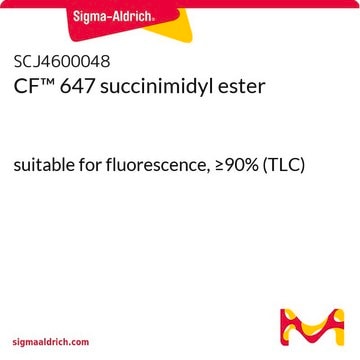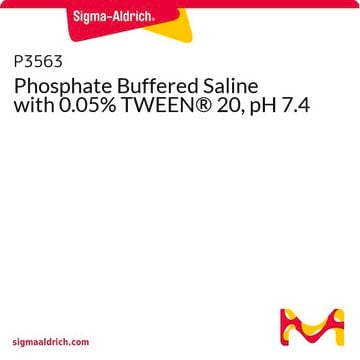08591
Sodium azide solution
0.1 M
Synonym(s):
Sodium azide solution, Additive Screening Solution 45/Kit-No 78374
Sign Into View Organizational & Contract Pricing
All Photos(1)
About This Item
CAS Number:
MDL number:
UNSPSC Code:
12352125
PubChem Substance ID:
NACRES:
NA.32
Recommended Products
product name
Sodium azide 0.1 M solution,
Quality Level
density
1.00 g/mL at 20 °C
storage temp.
2-8°C
SMILES string
[Na]N=[N+]=[N-]
InChI
1S/N3.Na/c1-3-2;/q-1;+1
InChI key
PXIPVTKHYLBLMZ-UHFFFAOYSA-N
Application
Sodium azide 0.1M solution has been used as a preservative for phosphate buffer. It has also been used as an inhibitor of ceruloplasmin activity.
Biochem/physiol Actions
Sodium azide is a preservative for laboratory reagents. It also works as a plant mutagen. It is a F-type ATPase inhibitor and selectively inhibits ceruloplasmin.
Sodium azide 0.1M solution is an additive screening solution of Additive Screening Kit. Additive Screen kit is designed to allow rapid and convenient evaluation of additives and their ability to influence the crystallization of the sample. The Additive Kit provides a tool for refining crystallization conditions.
Sodium azide 0.1M solution is an additive screening solution of Additive Screening Kit. Additive Screen kit is designed to allow rapid and convenient evaluation of additives and their ability to influence the crystallization of the sample. The Additive Kit provides a tool for refining crystallization conditions.
related product
Product No.
Description
Pricing
Hazard Statements
Precautionary Statements
Hazard Classifications
Aquatic Chronic 3
Storage Class Code
12 - Non Combustible Liquids
WGK
WGK 1
Flash Point(F)
Not applicable
Flash Point(C)
Not applicable
Personal Protective Equipment
dust mask type N95 (US), Eyeshields, Gloves
Choose from one of the most recent versions:
Already Own This Product?
Find documentation for the products that you have recently purchased in the Document Library.
Ceruloplasmin dysfunction and therapeutic potential for Parkinson disease.
Ayton S et al.
Annals of Neurology, 73, 554-554 (2013)
Active immunization against vasoactive intestinal polypeptide decreases neuronal recruitment and inhibits reproduction in zebra finches.
Vistoropsky Y
The Journal of Comparative Neurology, 524, 2516-2516 (2016)
Clinical Environmental Health and Toxic Exposures (2001)
ABC Transporters: Biochemical, Cellular, and Molecular Aspects, 1998-1998 null
Isamu Aiba et al.
The Journal of physiology, 590(22), 5877-5893 (2012-08-22)
Spreading depolarizations (SDs) are slowly propagating waves of near-complete neuronal and glial depolarization. SDs have been recorded in patients with brain injury, and the incidence of SD significantly correlates with outcome severity. Although it is well accepted that the ionic
Our team of scientists has experience in all areas of research including Life Science, Material Science, Chemical Synthesis, Chromatography, Analytical and many others.
Contact Technical Service






